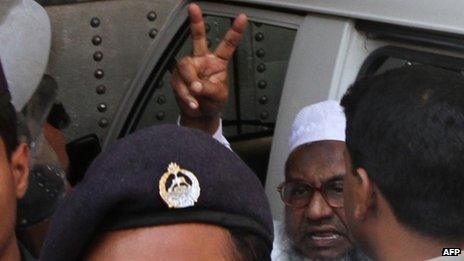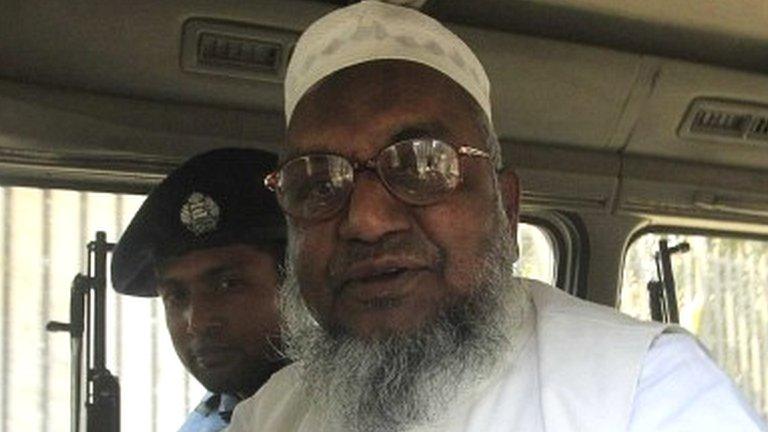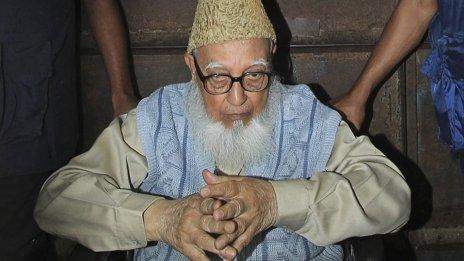Bangladesh court upholds Abdul Kader Mullah execution
- Published
The BBC's Mahfuz Sadique reports from Dhaka as Abdul Kader Mullah ie executed
Bangladesh's Supreme Court has upheld the death sentence of an Islamist leader, Abdul Kader Mullah.
The judge dismissed his appeal, saying it paved the way for his execution.
Mullah had been scheduled to be executed on Tuesday, before gaining a reprieve. No new date has been set.
He was convicted in February of crimes against humanity during the country's 1971 war of independence from Pakistan. The senior leader of the Jamaat-e-Islami party denies the charges.
Jamaat says that the trial is politically motivated.
Mullah's defence lawyer Abdur Razzak told the BBC that his client had been denied justice and that the case against him relied on the testimony of just one witness.
But Attorney-General Mahbubey Alam told the BBC that "since the review petition filed by Kader Mullah has already been dismissed by our highest court - namely the appellate division of the Supreme Court of Bangladesh - there is no legal bar to proceed in the execution order".
Mr Alam said that Mullah had exhausted all avenues of appeal. But Mullah's lawyers dispute his conclusions. His final hope rests with a presidential pardon.
His trial earlier this year sparked protests from Jamaat supporters. They accuse the government of pursuing a political vendetta which has resulted in the imprisonment of several of the party's senior leaders.
Security was stepped up in Dhaka in advance of Thursday's ruling.
Mullah is one of five Islamist leaders condemned to death by Bangladesh's International Crimes Tribunal (ICT), set up in 2010 to investigate atrocities committed during the 1971 conflict.
Nobody knows exactly how many people were killed. Independent researchers think that between 300,000 and 500,000 died. The Bangladesh government puts the figure at three million.
Counter-demonstrations
So far none of those convicted of war crimes has been executed.
Mullah - who is assistant secretary-general of Jamaat - was initially sentenced to life imprisonment for killing unarmed civilians and intellectuals in the Mirpur suburb of the capital Dhaka.
Thousands of protesters took to the streets demanding the death penalty, a move that prompted parliament to amend a law allowing the state to appeal against any verdict reached by the war crimes tribunal.
The Supreme Court then passed a death sentence, enraging Jammat supporters.
While the government explains the need to bring war criminals to justice, Jamaat has hit back with talk of Islam being under threat.

Mullah has always vigorously denied the charges
BBC Bengali Editor Sabir Mustafa says that Bangladesh is divided between Bengalis wanting to preserve their cultural and linguistic heritage and those wanting to foster a more overtly Islamist identity. Our correspondent says that the divisions go to the heart of the country's identity.
The government set up the special court to deal with those accused of collaborating with Pakistani forces who attempted to stop East Pakistan, as Bangladesh was then, from becoming an independent country. The two wings of Pakistan were held together mostly by a shared religion,
Bangladesh broke away from Pakistan 42 years ago after a war which saw killings on a mass scale, the exodus of more than 10 million refugees and military intervention by neighbouring India.
Human rights groups have said the special court falls short of international standards and that Mullah have another opportunity to appeal.
Jamaat is barred from contesting elections scheduled for 5 January but plays a key role in the opposition movement led by the Bangladesh Nationalist Party (BNP).
- Published11 December 2013

- Published8 December 2013

- Published4 September 2016
